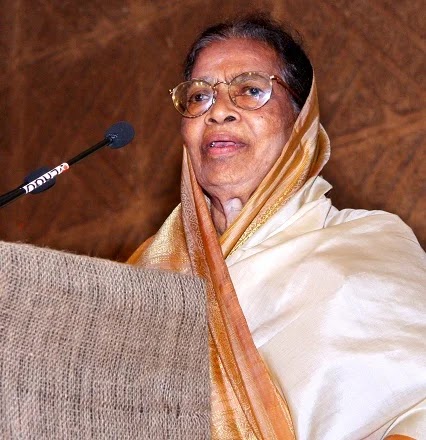Fatima Beevi First Female Judge of Supreme Court
Fathima Beevi passed away at a private hospital in Kollam, Kerala, on November 23, 2023 (Thursday). She was 96.
*🌺 ಸುಪ್ರೀಂ ಕೋರ್ಟ್ನ ಮೊದಲ ಮಹಿಳಾ ನ್ಯಾಯಮೂರ್ತಿ ಫಾತಿಮಾ ಬೀವಿ ನಿಧನ😢*
*ಭಾರತದ ಸರ್ವೋಚ್ಚ ನ್ಯಾಯಾಲಯಕ್ಕೆ ನೇಮಕಗೊಂಡ ಮೊದಲ ಮಹಿಳಾ ನ್ಯಾಯಾಧೀಶರಾದ ಜಸ್ಟಿಸ್ ಎಂ. ಫಾತಿಮಾ ಬೀವಿ ಅವರು ಗುರುವಾರ ನಿಧನಹೊಂದಿದರು.ಅವರಿಗೆ 96 ವರ್ಷ ವಯಸ್ಸಾಗಿತ್ತು.*
*ನ್ಯಾಯಮೂರ್ತಿ ಬೀವಿ ಅವರು ಭಾರತದ ಸರ್ವೋಚ್ಚ ನ್ಯಾಯಾಲಯದ ನ್ಯಾಯಾಧೀಶರಾದ ಮೊದಲ ಮಹಿಳೆ. ದೇಶದ ಉನ್ನತ ನ್ಯಾಯಾಂಗಕ್ಕೆ ನೇಮಕಗೊಂಡ ಮೊದಲ ಮುಸ್ಲಿಂ ಮಹಿಳೆಯೂ ಕೂಡ ಆಗಿದ್ದರು.*
*1989ರಲ್ಲಿ ಸುಪ್ರೀಂ ಕೋರ್ಟ್ಗೆ ನೇಮಕಗೊಂಡ ಮೊದಲ ಮಹಿಳೆ ಎಂಬ ಹೆಗ್ಗಳಿಕೆಗೆ ಪಾತ್ರರಾದರು.*
The first female judge to be appointed at the apex court, she has also served as the Governor of Tamil Nadu and a member of the National Human Rights Commission.
Fathima Bibi is a name permanently etched into Indian history, a name every judicial aspirant is familiar with. She was the first woman to be appointed a Supreme Court Justice of India.
Early Life and Education
Fathima Beevi was born on 30th April, 1927 at Pathanamthitta, in the erstwhile state of Travancore (presently the Indian state of Kerala) to Khadeja Bibi and Annaveetil Meera Sahib, a government servant. She was the eldest of six sisters and two brothers. She completed her schooling from Catholicate High School in Pathanamthitta in 1943. She moved to Trivandrum for her higher education, staying there for six years. She completed a B.Sc. from University College, Thiruvananthapuram after which she enrolled herself to study law from Government Law College, Thiruvananthapuram.
Initially, she wanted to study the sciences further, but her father possibly motivated by the success of Ms. Anna Chandy (the first female judge in India and also the first woman in India to become a High Court judge) who was working near their house, encouraged Beevi to study law instead. Fatima Beevi was one of the only five female students in her class in law school, a number that later dropped to three. However, this did not demotivate her, after obtaining her law degree in 1950, she gave the Bar Council of India exam and became the first woman to top the exam, and received the Bar Council gold medal, the first of her historic achievements.
Judicial career
She was enrolled as Advocate on 14 November 1950. She began her career in the lower judiciary in Kerala. She was appointed as the Munsiff in the Kerala Sub-ordinate Judicial Services in May, 1958. She was promoted as the Sub-ordinate Judge in 1968 and as the Chief Judicial Magistrate in 1972, as District & Sessions Judge in 1974.
She was further appointed as the Judicial Member of the Income Tax Appellate Tribunal in January, 1980. She was then elevated to the High Court as a Judge on 4 August 1983.
She became permanent Judge of the High Court on 14 May 1984. She retired as the Judge of the High Court on 29 April 1989 but was further elevated to the Supreme Court as a Judge on 6 October 1989 where she retired on 29 April 1992. Her appointment to the Supreme Court over several senior judges was seen as a political decision by Rajiv Gandhi following the controversy over the Muslim Women's (Protection of Rights on Divorce) Act.
Governor of Tamil Nadu: She later went on to become Governor of Tamil Nadu on 25 January 1997. Appointing her as the Governor of the TN and Justice Sukhdev Singh Kang, former Chief Justice of Jammu and Kashmir High Court, as Governor of Kerala, the then President of India, Shankar Dayal Sharma said "Their experience of and insights into the working of the Constitution and the laws comprise valuable assets."
As the Governor of the state, she rejected the mercy petitions filed by the four condemned prisoners in the Rajiv Gandhi assassination case.The prisoners had sent the mercy petitions to the Governor, pleading her to exercise her power under Article 161 of the Constitution (the Governor's power to grant pardon).
Conclusion
Justice M. Fathima Beevi led an inspiring life in the times when women were rigidly stuck in the patriarchal society and suffering gender discrimination. As rightly said by Justice. Bevi, “I opened the way…” she paved the way for the women to the Apex body of Justice. Even though the number of female Judges in the Supreme Court remains low, right now three female judges are active in the Apex court. She has received Hon. D Litt and Mahila Shiromani Award in 1990, she also bagged Bharat Jyoti Award. She pointed out in recent years that there is a need to increase the representation of women in the higher judiciary, she also advocates about bringing reservation for women in the higher judiciary to increase their representation.




No comments:
Post a Comment
If You Have any Doubts, let me Comment Here